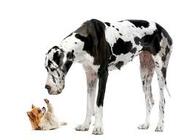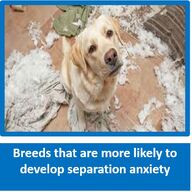
Especially is you have a cross breed, it is always a great idea to find our the DNA make up of your dog. This will let you know if any genetic concerns, what your dog is bred for which will help you with mental and physical stimulation. You will also start to understand why your dog acts the way he does, as well as become aware of possible health problems. By knowing the breeds, much easier to for you to find out his compatibility with other dogs. Easy to do and in the comfort of your own home - www.muttmix.co.za
SO-CALLED ‘BREEDERS’ CAN BE DIVIDED INTO 3 GROUPS, TRUE PROFESSIONAL BREEDERS, COMMERCIAL ‘BREEDERS’, AND ACCIDENTAL ‘BREEDERS’

PROFESSIONAL BREEDERS
We need, without them we would lose all the wonderful breeds we have. If all breeders were these, animals would be rarer, more in demand, and more valued by the public. They are generally the people who DENY being breeders.
Their motivation is a sincere love of a breed and a genuine interest in its future and improvement. They don’t just breed with their animals, they play with them, groom them, take them out socialising, show them, train them. They don’t want their breed to be too popular with the general public.
They give puppy/kitten buyers a hard time, tell them the disadvantages of the breed, interrogate them and put them on waiting lists. They sell puppies or kittens from their own premises and never mind anyone visiting their home or kennel.
They can show you the parents, and want to do so. They seldom sell animals with breeding rights (except to each other) and follow up to make sure others buyers have sterilised their puppy/kitten at the right time. Owners of males are very selective in giving stud services. They breed very little and don’t care if they do so at a financial loss. The watch trends in the breed and don’t breed at times when the market is flooded. They don’t need to advertise litters in the free press, or sell animals to pet shops, (different from displaying in good pet shops and doing the interview and sale at home, this is a bit of a grey area).
They network with other pro breeders and their potential buyers through dedicated animal publications, buyers go searching for them, they don’t have to look for buyers. They never breed with too young, too old or too closely related animals or on consecutive heats. They don’t allow a mating to take place until they have a committed list of suitable buyers. They constantly improve their knowledge and worry that they don’t know enough. They usually breed one or two breeds for a lifetime.
They breed for temperament and health as well as looks, because they know most of the animals are going to be in people’s homes with their kids and other animals, not in the show ring.
They know what hereditary defects are found in the breed and always do the necessary X-rays, tests etc and don’t breed with animals carrying defects. They sterilise and keep as pets, or sterilise and rehome as pets, retired or unsuitable breeding stock. They always vaccinate and deworm properly, because they are knowledgeable about infectious diseases and parasite control. They microchip their babies and make sure they are traceable back to them. They stay in touch with buyers and check on the welfare of their offspring lifelong. Most important of all, they will always take back any animal bred by them, and take responsibility for it. Animals bred by them never end up in welfare.
STATISTICALLY, IF EVERY HOUSEHOLD OF FOUR PEOPLE, PHYSICALLY AND FINANCIALLY ACCEPTABLE FOR PETS, HAS AN AVERAGE OF TWO DOGS AND TWO CATS, PROPERLY CARED FOR, FOR A TEN YEAR LIFESPAN, ONLY ONE PERSON IN EVERY THOUSAND NEEDS TO BE A PROFESSIONAL BREEDER WITH ONLY TWO BREEDING FEMALE ANIMALS.
COMMERCIAL BREEDERS
We don’t need, they are responsible for creating most of the problems in welfare. They make supply exceed demand and devalue animal’s lives. They make it too easy for the wrong people to get animals. They boast that they are professional breeders.
Their motivation is profit and they don’t care about the future of the breed. Their animals are just there to breed, they have little or no other relationship with them. They want everyone to have their breed. They sell them to anyone and tell everyone they should have one. They advertise or sell from anywhere and never see, hear from, or think of the animal again. Many deliver the animals in a public place so buyers don’t see the breeding stock and conditions.
They tell buyers to breed. They always have the BEST male that everyone must use as a stud. They breed on every heat, from the first, and as many litters as they can get from each parent animal. They breed for profit and cut corners on facilities, food, and veterinary care to try and keep making as much profit as possible. They breed as many as possible, regardless of how many of their breed are sitting in shelters, being put down, or advertised in the free press.
They are not prepared to care for babies after weaning (when mommy stops cleaning up!) and sell underage puppies and kittens to agents and pet dealers. They think they know everything. They don’t know or care or test if their stock are carrying any hereditary defects, but will always claim to KNOW for sure they are fine if buyers ask.
They produce breeds that are always the most irresistible as puppies, or the latest fashion (either farming Labs, Dachsies, Spaniels, Siamese, etc all the time, or Staffies in the 70’s, Rotti’s in the 80’s, Dalmatians in the 90’s, Sharpeis and BIGGER Boerboels in the 2000’s then Chinese crested, now pocket |Yorkies and Minpins and Maine coons!) (Apologies to the true pro breeders of these for having to mention them here).
They sell to even worse breeders, or dump unsterilized on welfare, the animals that are no longer profitable breeders. Some breed inbred offspring, even from parents that are brother and sister. Some even deliberately breed crossbreeds that have proven to be cute or impressive easy-seller.
They don’t vaccinate, or obtain vaccination on the black market (or actually don’t) and forge their own vaccination cards. (while debatable if it is right for a developing country, as the law stands at present the only legal vac certificate is issued by a vet clinic or registered Welfare organisation and is signed by a qualified vet, AWO or veterinary nurse, and has the vaccine brand and batch no). They don’t deworm or think one dose of deworming before sale is ok, don’t deworm their breeding stock, and have no clue what coccidia or giardia or ringworm actually are.
They would never microchip in their name because the last thing they want is any of those babies ever being their problem in the future…well, they might take them back if they can be bred with but no chance if they are old, sterilised or those terrible temperaments or hereditary defects have shown themselves.
They don’t know or care where their offspring are or how they are living or being treated. It doesn’t cross their minds that impulsive people to whom they have sold move to properties that don’t take animals, or give animals to staff who live in squatter camps, or the rarer but true stories of heavy dogs being used to detonate landmines, pretty dogs and cats being skinned for fur etc. Animal shelters are full of their animals all the time.
ACCIDENTAL BREEDERS
Are totally responsible themselves for deciding whether they are more of a curse than a commercial breeder, or almost as acceptable as a professional breeder.
Take the accidental breeder who loves the parent animal/s, who realises that he has made a big blunder, asks for advice, does a crash course to get his knowledge up to scratch, works with his vet and knowledgeable breeders, compensates for his error (e.g. does all he can with correct nutrition to feed too young a mommy correctly), keeps the babies till they are old enough to sterilise early, homes them with lifelong interest in their welfare, and sterilises the parent/s so it can’t happen again.
He has done very little harm. Properly and responsibly handled, an unplanned pregnancy can have as its only negative the fact that it took up spaces in homes that could have been for shelter animals.
All of the most gorgeous mongrels and moggies that so many of us own and adore are accidents that turned out well BUT MUST NOT GO ANY FURTHER.
The accidental breeder who actually doesn’t care if his animals breed and does nothing to stop is worse than a profiteering commercial breeder because he invariably dumps the babies he can’t home on welfare, they are more often than not crossbreeds, and the ones he does home mostly go to his equally irresponsible friends and family and the oke he met at the pub, who do exactly the same and continue the cycle. He is also the least likely to learn anything about breeding or spend any money on proper veterinary care etc because he’s not making anything out of it. This is where the rest of animals dying in shelters come from. The accidental breeder must choose which he will be.
We need, without them we would lose all the wonderful breeds we have. If all breeders were these, animals would be rarer, more in demand, and more valued by the public. They are generally the people who DENY being breeders.
Their motivation is a sincere love of a breed and a genuine interest in its future and improvement. They don’t just breed with their animals, they play with them, groom them, take them out socialising, show them, train them. They don’t want their breed to be too popular with the general public.
They give puppy/kitten buyers a hard time, tell them the disadvantages of the breed, interrogate them and put them on waiting lists. They sell puppies or kittens from their own premises and never mind anyone visiting their home or kennel.
They can show you the parents, and want to do so. They seldom sell animals with breeding rights (except to each other) and follow up to make sure others buyers have sterilised their puppy/kitten at the right time. Owners of males are very selective in giving stud services. They breed very little and don’t care if they do so at a financial loss. The watch trends in the breed and don’t breed at times when the market is flooded. They don’t need to advertise litters in the free press, or sell animals to pet shops, (different from displaying in good pet shops and doing the interview and sale at home, this is a bit of a grey area).
They network with other pro breeders and their potential buyers through dedicated animal publications, buyers go searching for them, they don’t have to look for buyers. They never breed with too young, too old or too closely related animals or on consecutive heats. They don’t allow a mating to take place until they have a committed list of suitable buyers. They constantly improve their knowledge and worry that they don’t know enough. They usually breed one or two breeds for a lifetime.
They breed for temperament and health as well as looks, because they know most of the animals are going to be in people’s homes with their kids and other animals, not in the show ring.
They know what hereditary defects are found in the breed and always do the necessary X-rays, tests etc and don’t breed with animals carrying defects. They sterilise and keep as pets, or sterilise and rehome as pets, retired or unsuitable breeding stock. They always vaccinate and deworm properly, because they are knowledgeable about infectious diseases and parasite control. They microchip their babies and make sure they are traceable back to them. They stay in touch with buyers and check on the welfare of their offspring lifelong. Most important of all, they will always take back any animal bred by them, and take responsibility for it. Animals bred by them never end up in welfare.
STATISTICALLY, IF EVERY HOUSEHOLD OF FOUR PEOPLE, PHYSICALLY AND FINANCIALLY ACCEPTABLE FOR PETS, HAS AN AVERAGE OF TWO DOGS AND TWO CATS, PROPERLY CARED FOR, FOR A TEN YEAR LIFESPAN, ONLY ONE PERSON IN EVERY THOUSAND NEEDS TO BE A PROFESSIONAL BREEDER WITH ONLY TWO BREEDING FEMALE ANIMALS.
COMMERCIAL BREEDERS
We don’t need, they are responsible for creating most of the problems in welfare. They make supply exceed demand and devalue animal’s lives. They make it too easy for the wrong people to get animals. They boast that they are professional breeders.
Their motivation is profit and they don’t care about the future of the breed. Their animals are just there to breed, they have little or no other relationship with them. They want everyone to have their breed. They sell them to anyone and tell everyone they should have one. They advertise or sell from anywhere and never see, hear from, or think of the animal again. Many deliver the animals in a public place so buyers don’t see the breeding stock and conditions.
They tell buyers to breed. They always have the BEST male that everyone must use as a stud. They breed on every heat, from the first, and as many litters as they can get from each parent animal. They breed for profit and cut corners on facilities, food, and veterinary care to try and keep making as much profit as possible. They breed as many as possible, regardless of how many of their breed are sitting in shelters, being put down, or advertised in the free press.
They are not prepared to care for babies after weaning (when mommy stops cleaning up!) and sell underage puppies and kittens to agents and pet dealers. They think they know everything. They don’t know or care or test if their stock are carrying any hereditary defects, but will always claim to KNOW for sure they are fine if buyers ask.
They produce breeds that are always the most irresistible as puppies, or the latest fashion (either farming Labs, Dachsies, Spaniels, Siamese, etc all the time, or Staffies in the 70’s, Rotti’s in the 80’s, Dalmatians in the 90’s, Sharpeis and BIGGER Boerboels in the 2000’s then Chinese crested, now pocket |Yorkies and Minpins and Maine coons!) (Apologies to the true pro breeders of these for having to mention them here).
They sell to even worse breeders, or dump unsterilized on welfare, the animals that are no longer profitable breeders. Some breed inbred offspring, even from parents that are brother and sister. Some even deliberately breed crossbreeds that have proven to be cute or impressive easy-seller.
They don’t vaccinate, or obtain vaccination on the black market (or actually don’t) and forge their own vaccination cards. (while debatable if it is right for a developing country, as the law stands at present the only legal vac certificate is issued by a vet clinic or registered Welfare organisation and is signed by a qualified vet, AWO or veterinary nurse, and has the vaccine brand and batch no). They don’t deworm or think one dose of deworming before sale is ok, don’t deworm their breeding stock, and have no clue what coccidia or giardia or ringworm actually are.
They would never microchip in their name because the last thing they want is any of those babies ever being their problem in the future…well, they might take them back if they can be bred with but no chance if they are old, sterilised or those terrible temperaments or hereditary defects have shown themselves.
They don’t know or care where their offspring are or how they are living or being treated. It doesn’t cross their minds that impulsive people to whom they have sold move to properties that don’t take animals, or give animals to staff who live in squatter camps, or the rarer but true stories of heavy dogs being used to detonate landmines, pretty dogs and cats being skinned for fur etc. Animal shelters are full of their animals all the time.
ACCIDENTAL BREEDERS
Are totally responsible themselves for deciding whether they are more of a curse than a commercial breeder, or almost as acceptable as a professional breeder.
Take the accidental breeder who loves the parent animal/s, who realises that he has made a big blunder, asks for advice, does a crash course to get his knowledge up to scratch, works with his vet and knowledgeable breeders, compensates for his error (e.g. does all he can with correct nutrition to feed too young a mommy correctly), keeps the babies till they are old enough to sterilise early, homes them with lifelong interest in their welfare, and sterilises the parent/s so it can’t happen again.
He has done very little harm. Properly and responsibly handled, an unplanned pregnancy can have as its only negative the fact that it took up spaces in homes that could have been for shelter animals.
All of the most gorgeous mongrels and moggies that so many of us own and adore are accidents that turned out well BUT MUST NOT GO ANY FURTHER.
The accidental breeder who actually doesn’t care if his animals breed and does nothing to stop is worse than a profiteering commercial breeder because he invariably dumps the babies he can’t home on welfare, they are more often than not crossbreeds, and the ones he does home mostly go to his equally irresponsible friends and family and the oke he met at the pub, who do exactly the same and continue the cycle. He is also the least likely to learn anything about breeding or spend any money on proper veterinary care etc because he’s not making anything out of it. This is where the rest of animals dying in shelters come from. The accidental breeder must choose which he will be.




